

Cognitive Skills and the Aging Brain: What to Expect. Every day we perform hundreds of cognitive tasks but are mostly unaware of the effort involved.
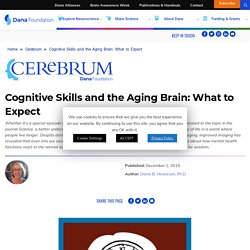
These tasks take different forms, such as noticing colors, remembering names, or calculating time on a watch. Measures of brain function using functional magnetic resonance imaging (fMRI) show that the most active areas of the brain vary according to the task being performed. The data confirm what researchers have known for many years: that our mental functions are composed of many distinct types of cognitive abilities. How memory and thinking ability change with age. Scientists used to think that brain connections developed at a rapid pace in the first few years of life, until you reached your mental peak in your early 20s.
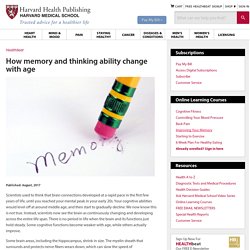
Your cognitive abilities would level off at around middle age, and then start to gradually decline. We now know this is not true. Instead, scientists now see the brain as continuously changing and developing across the entire life span. There is no period in life when the brain and its functions just hold steady. Some cognitive functions become weaker with age, while others actually improve.
Some brain areas, including the hippocampus, shrink in size. On the other hand, the branching of dendrites increases, and connections between distant brain areas strengthen. Age is also the biggest risk factor for many brain diseases, most of which affect brain structure and function. Normal Cognitive Aging. Senior Brain Boosters: Tips for Avoiding Age-Related Memory Loss.
Memory loss: 7 tips to improve your memory. Memory loss: 7 tips to improve your memory Try these simple ways to improve your memory.
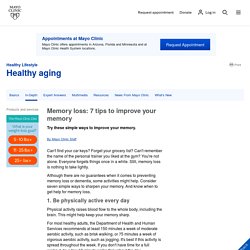
By Mayo Clinic Staff Can't find your car keys? Forget your grocery list? Can't remember the name of the personal trainer you liked at the gym? Preventing Memory Loss With Aging. She could deal with constantly forgetting her shopping list, and she'd made a habit of writing down where she'd parked her car, each and every time.
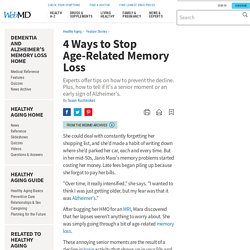
But in her mid-50s, Janis Mara's memory problems started costing her money. Late fees began piling up because she forgot to pay her bills. "Over time, it really intensified," she says. "I wanted to think I was just getting older, but my fear was that it was Alzheimer's. " Memory Loss & Forgetfulness: Causes, Symptoms, Treatments. Many older people worry about becoming more forgetful.
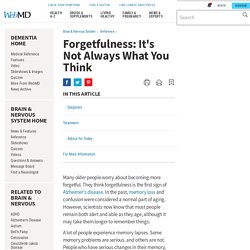
They think forgetfulness is the first sign of Alzheimer's disease. In the past, memory loss and confusion were considered a normal part of aging. However, scientists now know that most people remain both alert and able as they age, although it may take them longer to remember things. A lot of people experience memory lapses. Memory and aging. How to Improve Your Memory: Tips and Exercises to Sharpen Your Mind and Boost Brainpower. Whether you’re looking to sharpen your mind, boost your mental performance, or preserve your memory as you age, these tips can help.
How to boost brain power at any age A strong memory depends on the health and vitality of your brain. Whether you’re a student studying for final exams, a working professional interested in doing all you can to stay mentally sharp, or a senior looking to preserve and enhance your grey matter as you age, there’s lots you can do to improve your memory and mental performance. They say that you can’t teach an old dog new tricks, but when it comes to the brain, scientists have discovered that this old adage simply isn’t true.
The human brain has an astonishing ability to adapt and change—even into old age. Senior Brain Boosters: Tips for Avoiding Age-Related Memory Loss. Memory loss: 7 tips to improve your memory. Preventing Memory Loss With Aging. Free Memory Loss Tests - MemoryHealthCheck. Test your memory health and function with these free online screening tests: Short term memory is the ability to form and retain very recent memories, such as what you had for breakfast this morning, and recalling details from a news article that you read 10 minutes ago.
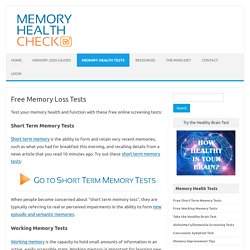
Try out these short term memory tests: When people become concerned about “short term memory loss”, they are typically referring to real or perceived impairments in the ability to form new episodic and semantic memories. Working memory is the capacity to hold small amounts of information in an active, easily accessible state. Aging and cognitive abilities. Age-Related Memory Loss: What's Normal, What's Not, and When to Seek Help. Worried about your forgetfulness? Learn what’s normal when it comes to memory and aging, and how to recognize the signs of more serious problems.
Memory and aging We’ve all misplaced keys, blanked on someone’s name, or forgotten a phone number. When you’re young, you don’t tend to pay much attention to these lapses, but as you grow older, you may worry about what they mean. Perhaps you start to talk about a movie you saw recently when you realize you can’t remember the title. As you grow older, you experience physiological changes that can cause glitches in brain functions you’ve always taken for granted. Are Your Memory Changes Due to Getting Older? How to Tell. Contributor: Ronan Factora, MD Cleveland Clinic is a non-profit academic medical center.

Advertising on our site helps support our mission. We do not endorse non-Cleveland Clinic products or services. Policy You’ve probably heard this phrase before: “I’m just getting older.” The explanation should be used with caution, though. People frequently use this expression to dismiss daily symptoms, which could result from an underlying disease, leading to needless suffering that could have been evaluated and appropriately treated.
Memory complaints do occur very frequently as you get older. These are normal aging experiences, but none of these changes should affect your ability to remain independent in performing basic and instrumental daily living activities. The Non-Alzheimer’s Causes Of Memory Loss. As we and our loved ones age, it’s reasonable to occasionally forget things—we all do it at some points.
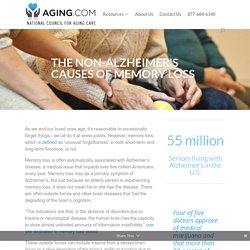
However, memory loss, which is defined as “unusual forgetfulness” in both short-term and long-term functions, is not. Memory loss is often automatically associated with Alzheimer’s disease, a medical issue that impacts over five million Americans every year. Memory loss may be a primary symptom of Alzheimer’s, but just because an elderly person is experiencing memory loss, it does not mean he or she has the disease. There are often outside forces and other brain diseases that fuel the degrading of the brain’s cognition. “The indications are that, in the absence of disorders due to trauma or neurological disease, the human brain has the capacity to store almost unlimited amounts of information indefinitely,” one site dedicated to memory loss stated.
Age-Related Memory Decline: Current Concepts and Future Directions. The effect of age on memory and the brain has been the focus of many studies.
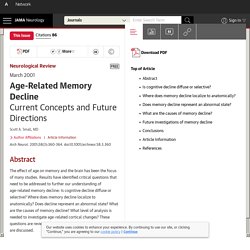
Memory Loss & Forgetfulness: Causes, Symptoms, Treatments. What we need to know about age related memory loss. How memory and thinking ability change with age. Memory and aging. Memory Storage - Memory Processes - The Human Memory. Storage is the more or less passive process of retaining information in the brain, whether in the sensory memory, the short-term memory or the more permanent long-term memory.
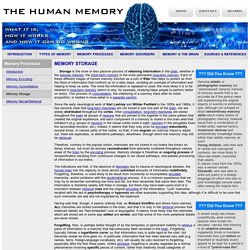
Each of these different stages of human memory function as a sort of filter that helps to protect us from the flood of information that confront us on a daily basis, avoiding an overload of information and helping to keep us sane. The more the information is repeated or used, the more likely it is to be retained in long-term memory (which is why, for example, studying helps people to perform better on tests). This process of consolidation, the stabilizing of a memory trace after its initial acquisition, is treated in more detail in a separate section. Since the early neurological work of Karl Lashley and Wilder Penfield in the 1950s and 1960s, it has become clear that long-term memories are not stored in just one part of the brain, but are widely distributed throughout the cortex. How to Improve Your Memory: Tips and Exercises to Sharpen Your Mind and Boost Brainpower.